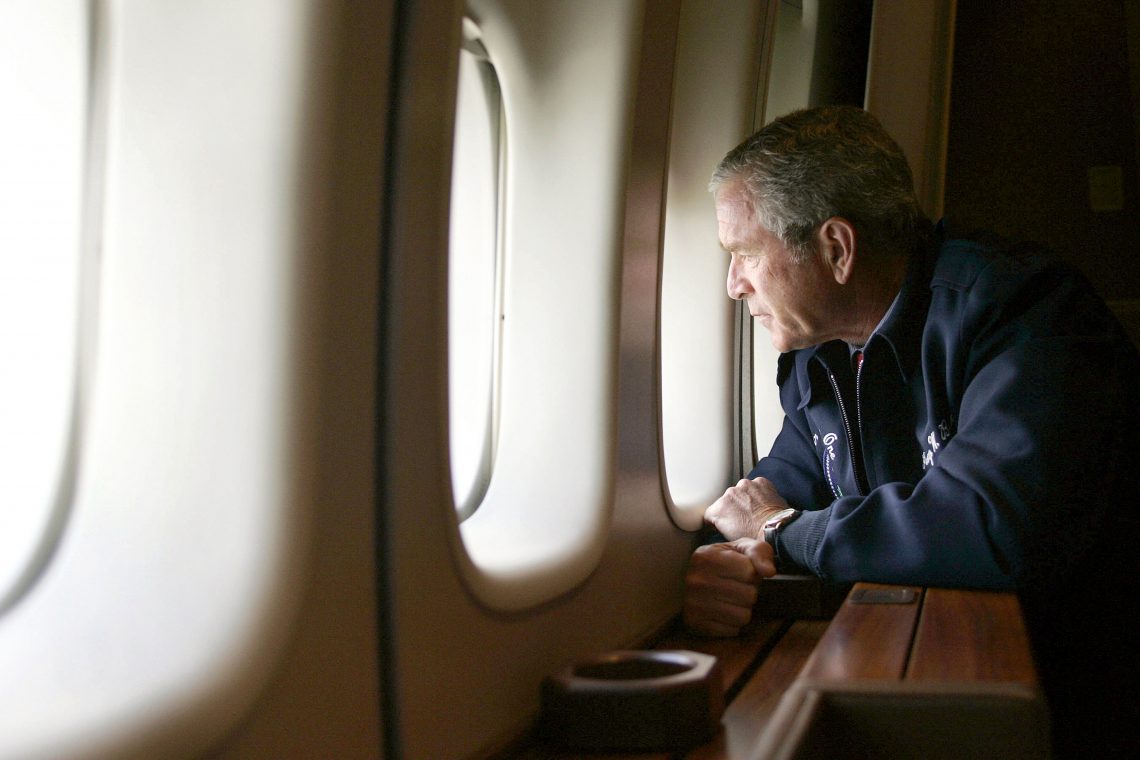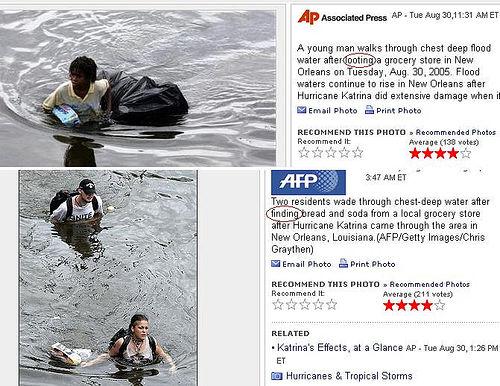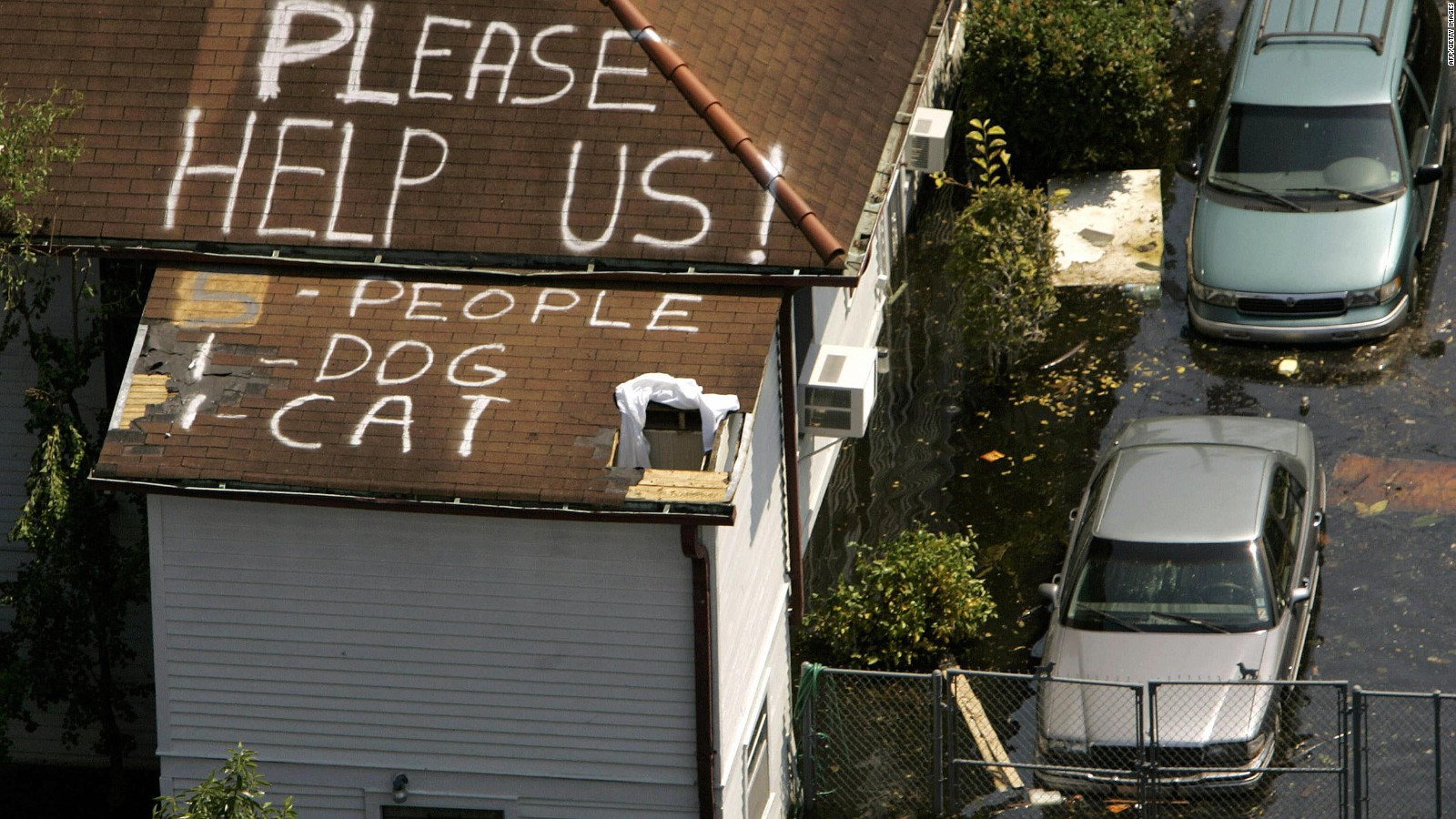“Who is Katrina?” I asked my mother curiously. Just moments before I had been in the kitchen slapping together a sandwich when I heard her scream about “that foul bitch Katrina.” Nosy, I poked my head into her room to see her and her girlfriend Nikki sitting opened mouth in front of the TV. My mother was often dramatic, but her voice trembled with pure misery as she began to explain to her 11-year-old daughter about the hurricane that had just ravaged the gulf coast. At that point in time, the levees had just broke and unleashed water into the city streets. On screen, bloated bodies floated through thick brown water. Women and children cried as news cameras careened through crowds of people stuck on highway overpasses or rooftops. The president of the United States looked out of an airplane window.

That particular image stuck with me when Kanye West made his infamous statement, “George Bush doesn’t care about black people.” Twelve years later, as I watched Donald Trump awkwardly kiss black Harvey victims and tell survivors to “have a good time”, a masochistic part of me wishes to go back and fully swallow the racist and classist nuances that increased Hurricane Katrina’s impact as an environmental, economic, and social disaster.
When most New Orleans residents began getting warnings about Hurricane Katrina, it wasn’t a big deal. The last major storm to pass through had been Hurricane Betsy, in 1965. Hurricane warnings came every year, and every year staying situated and riding out the storm appealed to most. After all, evacuation was (and still is) expensive. It requires transportation, food, and boarding accommodations. This was especially tough for the city’s black residents. Before Katrina, “Only 17 percent of poor whites lacked access to a car, while nearly 60 percent of poor blacks did.” (Stivers) Also, prior to the storm, the black poverty rate in New Orleans was three times that of whites. Basically evacuation was either impossible or irrational to most folks. So when then-Mayor Ray Nagin issued a “mandatory” evacuation, it wasn’t a surprise that people were trapped in the city. “Hurricane related disaster plans from the federal government took up several feet of shelf space in state and local offices. ‘Nobody ever actually reads them,’ commented the emergency director for Plaquemines Parish.” (Stivers) The city was so ill prepared for a disaster that it had ignored data showing 127,000 people didn’t have access to vehicles.
As countless articles and essays have mused before me, help came slowly for this majority brown group of survivors. From poor inter-agency communication to lack of planning, multiple agencies and politicians failed to bring speedy relief to Katrina victims. There were blatant cases of classism. For instance, “Seven hundred guests at a hotel across from the Superdome were brought to the head of the line of evacuees waiting to get on long-delayed buses.” (Stivers) The people staying in the Superdome (which had been branded as a last resort) were treated as inferiors to hotel guests. It’s a representation of a larger trend in responses to natural disasters, in which citizens are placed on a hierarchy for a chance at survival.
As government agencies half-heartedly scrambled to send help to the people of New Orleans, something else was happening in the media. Katrina’s victims were virtually being stripped of dignity and citizenship. Some stations called them refugees, implying that the scores of newly homeless American citizens were foreign. Other stations were quick to deign survivors as “looters”- depending on their skin tone, of course. Remember the following blunder?

Rumors swirled about escaped convicts, baby rapists, and gangs of criminals roving the streets causing terror. Using the tried and true “black people are being criminals, fear for your life” narrative, the media subliminally encouraged the general public to see Katrina victims as mechanics of their own suffering. After all, they should have just evacuated the city when they had the chance, right?
As the days passed by, things got uglier. Thousands of evacuees were turned away by white citizens of Gretna, Louisiana on September 1st, after making a lengthy trek from the convention center. Gretna citizens brandished guns and told the evacuees to turn around. Speaking of guns, conversations about whether or not to shoot looters raged across television networks as Katrina’s victims began to morph into dangerous troublemakers. Wrote Wall Street Journal’s Peggy Noonan, “As for the tragic piggism that is taking place on the streets of New Orleans, it is not unbelievable but it is unforgivable, and I hope the looters are shot.” Her sentiments were echoed by a plethora of right wing commentators. In 2017, extremist rightwing blogs like Brietbart and InfoWars are a dime a dozen, and we’re very much aware of their existence as catalysts in the “alt-right” movement. But in 2005, when blogs were just beginning to pop, secret corners of the internet were buzzing with racist commentary on Katrina and her victims. Foreshadowing the virtual alt-right forums that cradled Donald Trump’s rise to the presidency, these postings “[warned that] black evacuees would start crime sprees across the country, blaming the victims for their fate, and [proposed] strategies for sending aid that would exclusively target white survivors.” Message boards exploded with unverified anecdotes of Katrina survivors bringing drugs, weapons, and terror to cities across the country.
The painting of Katrina victims as criminals would have a gigantic ripple effect. We’ve all heard the jokes and the stereotypes about Katrina survivors mooching off of the government and the tragedy to indulge laziness or greed. It’s not shocking. I hate math, but this formula is pretty easy. Take a population systematically oppressed for centuries and squeezed into the cheapest (aka the most environmentally vulnerable) parts of the city. Add a hurricane. Subtract aid and evacuation possibilities. Add racist paranoia and stereotypes, and multiply it all by classist attitudes. What you’ve got left is fake concern, apathy, or malignancy for hurricane victims who were already dehumanized before disaster struck. Said Barbara Bush from a crowded Texas evacuee camp: “And so many of the people in the arena here, you know, were underprivileged anyway, so this, this is working very well for them.”
Before Katrina, the mostly brown people regulated to New Orleans’ poorest areas didn’t fudge up any sympathy from the national press. Despite significant economic and educational inequalities to their white peers, there were no prayers for Katrina or visits from the president. There was no allocation of funds for New Orleans’ starving children or their underpaid and overworked parents. In a nutshell, they were not that important. Maybe that’s why Ray Negan wasted precious time consulting area businesses before determining whether or not to announce a mandatory evacuation. Perhaps this is why it was so easy for FEMA to take their sweet ass time tending to victims. Or another wild thought… the Pre-Katrina status of black New Orleans citizens catalyzed George Bush’s decision to give a speech on Iraq (instead of the hurricane) after the city was already underwater.

As Kanye put it, George Bush did not care about black people. But neither did entire governmental agencies, including FEMA. One shocking example of their complete racism was that they “provided trailers to 63% of the residents of St. Bernard Parish, a predominately white area leveled by the flood, but only to 13% of the predominately black lower ninth ward.” (Walters) When the water slowly began to dry up and the 24 hour news cycles began to move on, black citizens of New Orleans faced a second storm. Prayers were sent, photo ops were completed, and documentaries were made- but survivors continued to suffer in the most surreptitious of ways. For weeks after, thousands were left without power and access to food and water. The poorest parishes were placed under martial law, with citizens treated like prisoners in their own city. All the while, right wing commentators denounced the struggling survivors as lazy, ungrateful, and spoiled. New arrivals to “refugee cities” were met with accusations of criminality. Institutional racism continued to rear its ugly head. Black workers of New Orleans were four times more likely than white counterparts to lose their jobs. Thousands of homeowners received abysmal checks from FEMA… as late as this year. Before Hurricane Katrina, New Orleans had 123 public schools. Post-Katrina, that number has shrunk to four as highly profitable (and largely failing) charter schools were eager to salvage the damaged city. If that wasn’t bad enough, “The Small Business Administration redlined black neighborhoods in New Orleans so that most of the applications from small businesses in the hardest-hit areas were denied. The Bush administration blocked a bipartisan bill to provide emergency loans. Meanwhile, the agency let large corporations receive $2 billion in federal contracts and excluded local minority contractors.”
Looking at footage of Trump in Houston makes me sick. To the non -brainwashed, its all a performance. One that makes me fearful for the future. The Trump and Bush administrations are vastly different, but equally negligent to the problems of black people. You know, in the same way that cantaloupe and watermelon are both equally garbage but have completely different tastes. It’s the classic “one evil is lesser” scenario. If Bush was bad, and Trump is evil, my fear for the well-being of black survivors of natural disasters during this administration has heightened considerably. When combing the web for info on Harvey, I expected the worst. And shit, it is bad. It’s being called one of the most damaging rainfalls in American history. Dozens of people have died. It will cost upwards of 503 billion dollars to repair things. Gas prices have gone up. But in my grief for the victims of the city of Houston, there was a silver lining so thick that I almost choked on it. Houston is 49% white and 25% black.
In this wildly racist country, that means the black people in Houston have a better chance at help and sympathy than the victims of Katrina ever did. When Katrina struck New Orleans, the city was roughly 67% black. America has shown that it can and will drag its feet when it comes to black pain and suffering. Slavery, lynching, “race riots”, Katrina, the Flint Water Crisis. Our lives have historically been devalued, but when in proximity to white ones suffering the same conditions, they matter just a little bit more. With this in mind, it’s terrifying to think of how this administration would handle a natural disaster that affected a predominately black city.
References
Charts Show How Hurricane Katrina Changed New Orleans (Kelsey Nowakowski)
“So Poor and So Black”: Hurricane Katrina, Public Administration, and the Issue of Race (Camilla Stivers)
We Looked Into The Effects Of Hurricane Harvey And Here’s What We Found (Frank Holmes)
A Guide to Hurricane Katrina and Its Aftermath (Jonah Walters)
When The Levees Broke: A Requiem in Four Acts (Spike Lee)
Race and Media Coverage of Hurricane Katrina: Analysis, Implications, and Future Research Questions (Tufts University)
“New Orleans was primed for all out combat: Remembering the media’s deadly Hurricane Katrina racism” (Heather Digby Parton)
Race, Class, and Hurricane Katrina: Social Differences in Human Responses to Disaster (James R. Elliot, Jeremy Pais)


Javarius Fields
June 16, 2018 3:17 pm
A great read!